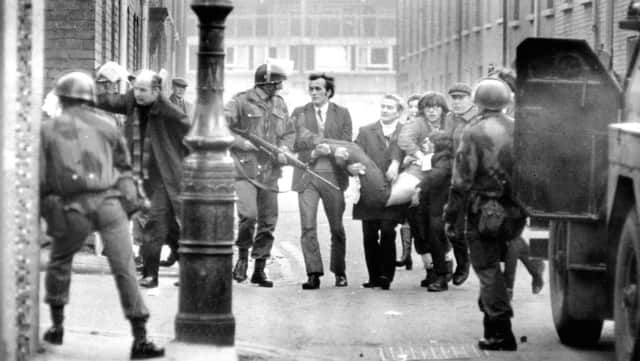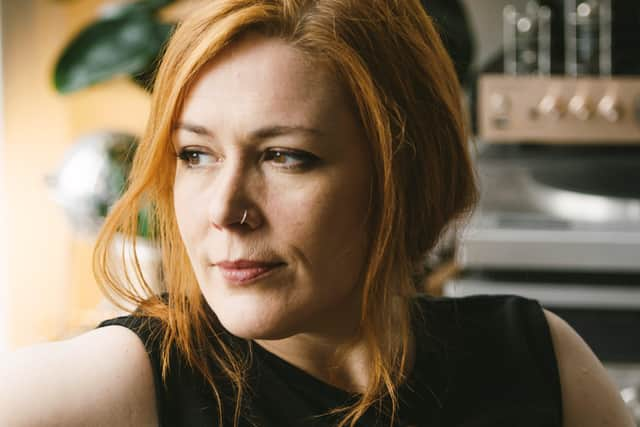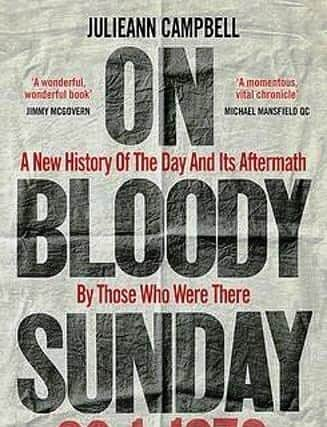‘On Bloody Sunday’: powerful new book allows people to tell their own stories


“Many people buried their experiences and trauma of Bloody Sunday,” she says. “Others felt compelled to tell their story in the hope of catharsis or education. As a relative myself [her maternal uncle, Jackie (17), was among those killed], I felt the need to keep asking and keep recording these accounts, knowing just how precious they were.”
The result of her endeavours is a compelling and truly groundbreaking new chronicle to be published later this month to mark the 50th anniversary of the Bogside massacre.
Advertisement
Hide AdAdvertisement
Hide AdThe eagerly-anticipated new volume - entitled ‘On Bloody Sunday’ - is to be published by Monoray Books, an imprint of Hachette UK, which was responsible for ‘The Only Plane in the Sky’, the highly-acclaimed oral history of 9/11.


The book is already being hailed as “momentous” and “wonderful”.
In it, survivors, relatives, eyewitnesses and politicians shine a light on the events of Bloody Sunday, together, for the first time. As they tell their stories, the tension, confusion and anger build with an awful power. ‘On Bloody Sunday’ unfolds before us an extraordinary human drama, as we experience one of the darkest moments in modern history - and witness the true human cost of conflict.
Julieann - a former reporter with the Derry Journal - says that, as children, she and her brothers were made aware of Bloody Sunday in a “general, visceral sense”.
Advertisement
Hide AdAdvertisement
Hide Ad“We were told stories about my uncle Jackie who went on a civil rights march and was shot by British soldiers,” she recalls.


“We were forbidden from ever attending marches or big crowded events ‘just in case’ of trouble, and any talk of religion or politics was actively discouraged at home.
“We knew Jackie’s face from family photographs, book covers and from the Bogside mural. Worse still, we knew him from the oft-used BBC news footage, aired every time the subject of Bloody Sunday made the evening news.
“I remember how we squirmed as children and teenagers, unsure of what to say, seeing mum subjected to her brother’s dying moments again and again. Nowadays, we have the foresight to tell her to turn away.
Advertisement
Hide AdAdvertisement
Hide Ad“Jackie’s other sister, my auntie, Kay, became the family campaigner in the 1990s, alongside their brother, Gerry, who was on the march that day like Jackie and another brother, Patrick. It’s through Kay, Gerry and my mother’s influence that I’ve written this book. I like to think that Uncle Jackie has a hand in it, too.”
‘On Bloody Sunday’ once again underscores the naked truth that what happened in Derry’s Bogside on January 30, 1972 stands apart from other British Army shootings as it occurred in broad daylight with countless eyewitnesses and in the full glare of the press.
Within hours, the British military establishment had informed embassies across the world that they had triumphed in a “gun battle” with the IRA, branding the dead as gunmen and bombers.
This fiction quickly became the official narrative of what happened on Bloody Sunday - a deep hurt only compounded by the whitewash of the Widgery Report (1972).
Advertisement
Hide AdAdvertisement
Hide AdAnd so it remained for decades until a family-led campaign, allied to international pressure, led to one of the most complex public inquiries in history.
Almost four decades after their deaths, victims were fully exonerated when Lord Saville published his report which found that the British Army fired first and at unarmed civilians.
He also concluded that the majority of victims were either shot in the back as they ran away or were gunned down while helping someone else in need. Not surprisingly, the publication of the report - and the follow-up apology from the British government - made headline news around the world.
‘On Bloody Sunday’, says Julieann Campbell, is unique in that it is the first ever complete oral history of Bloody Sunday.
Advertisement
Hide AdAdvertisement
Hide Ad“It moves on from previous works in that it conveys, in vivid, personal detail, the tragedy, conspiracy and dogged perseverance that changed the course of British and Irish history,” she says.
Among the 11o first-hand accounts presented in the book are 20 never-seen-before interviews by those impacted by the events of half a century ago.
These include relatives, witnesses, civil rights activists and, interestingly, the last ever interview given by Bishop Edward Daly which the author conducted just months before his death in August 2016.
This new testimony is presented alongside extracts of primary material gathered over the past decade or more.
Advertisement
Hide AdAdvertisement
Hide AdJulieann believes that bringing together these rich, disparate sources after fifty years ensures the broadest, most genuine narrative and has a greater emotional impact.
Alongside the voices of those most affected are extracts from police and army statements, highly relevant memos, intelligence reports and minutes of official meetings between the police in Northern Ireland and British military.
Julieann says that, as a former news reporter and oral historian “bound to listen and document”, she has aimed to be as impartial as possible.
“For this reason, I avoid over-editorialising within the narrative, allowing the people themselves to tell the story as it unfolds.
Advertisement
Hide AdAdvertisement
Hide Ad“Having worked closely with many involved this past decade or more, I am acutely aware of the sensitivities involved in producing this book and remain mindful of these issues from a moral and legal perspective.
“Where possible, and to contextualise, I include voices from across the spectrum of the Troubles, including both nationalist and unionist testimony as well as top chiefs within the British military and Royal Ulster Constabulary who gave evidence.”
No publication, the author acknowledges, could fully tell the story of Bloody Sunday and its impact.
“However, this book, collated with experience, purpose and passion, is the first fully to immerse readers in events as they transpired and through the eyes of those present,” she says.
Advertisement
Hide AdAdvertisement
Hide Ad“Collectively, these accounts show the true human cost of conflict and a case that is still very much present, debated and unresolved.”
Julieann is convinced that, fifty years on, the Bloody Sunday case is one of growing historical importance.
“The efforts of the people of Derry set a benchmark for justice campaigns everywhere,” she says.
“With civilian massacres like Bloody Sunday still occurring around the world today, the city’s story is a necessary reminder that states, and their military, are duty-bound to protect and serve all citizens equally and without prejudice.”
* ‘On Bloody Sunday’, by Julieann Campbell, is published by Monoray. It will be officially launched later this month and is available to buy from booksellers and online.